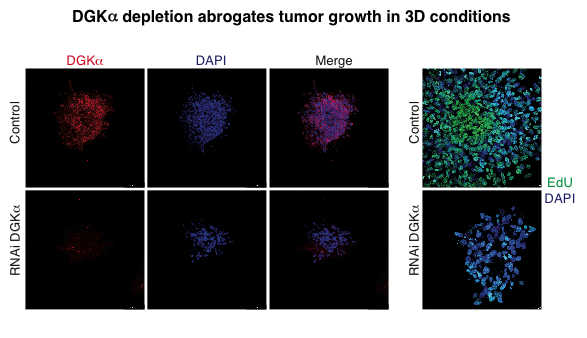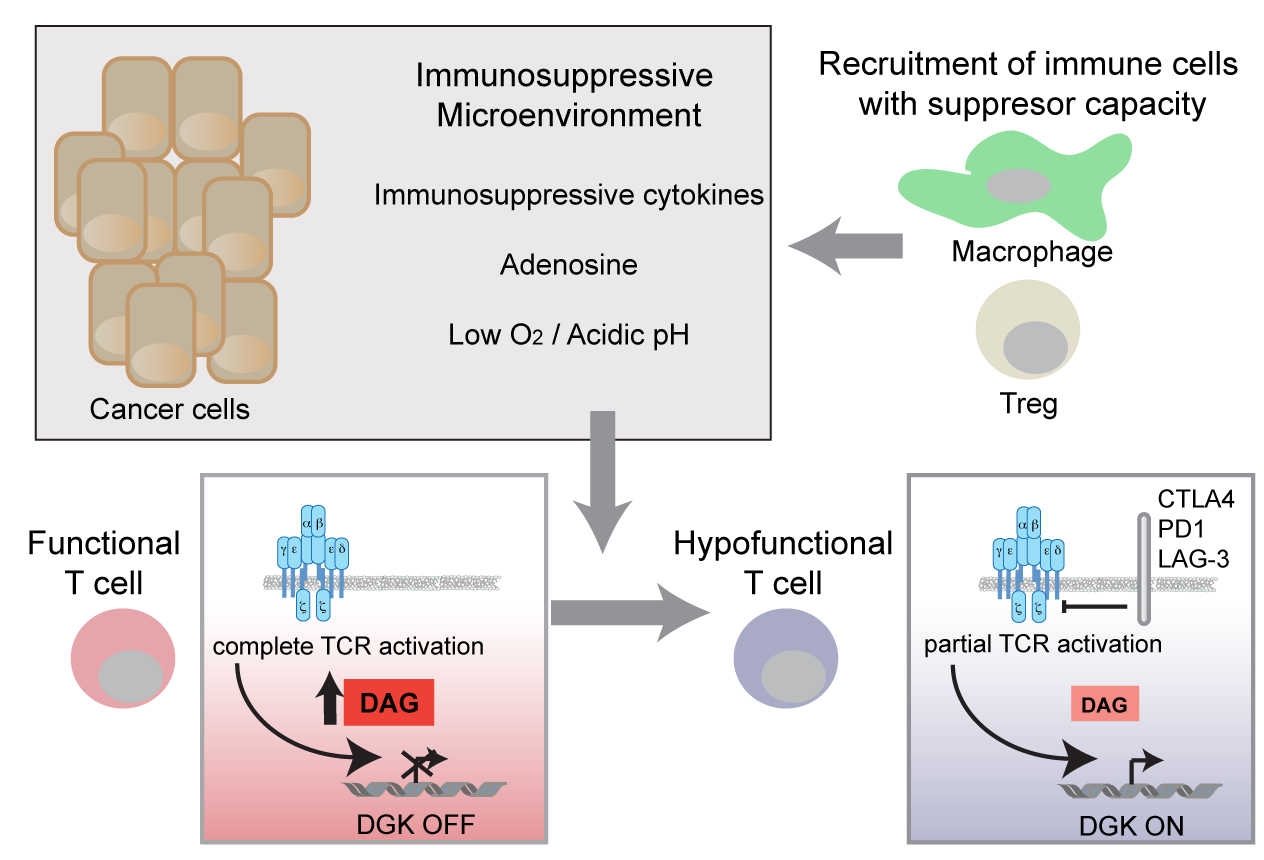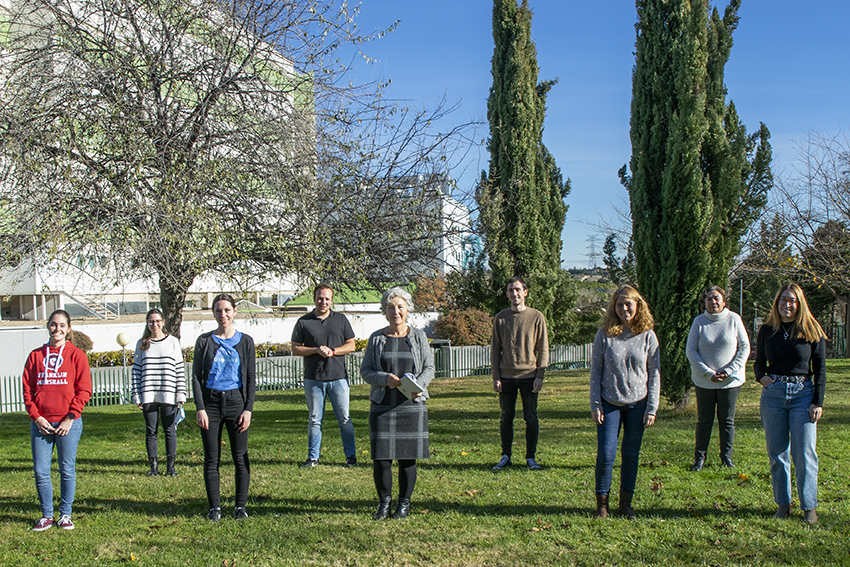Isabel Mérida
Group Leader
Research summary
Our group studies the contribution of DAG-regulated mechanisms to T cell activation and oncogenic transformation, so that steps of these processes can be manipulated for possible therapeutic benefit. Our goal is to demonstrate that modification of DAG metabolism is a novel, understudied strategy in the management of a more effective immune response and/or treatment of cancer.
Publications
Merino-Cortés SV, Gardeta SR, Roman-Garcia S, Martínez-Riaño A, Pineau J, et al. Diacylglycerol kinase ζ promotes actin cytoskeleton remodeling and mechanical forces at the B cell immune synapse. Sci Signal 2020; 13(627): eaaw8214.
González-Mancha N, Mérida I. Interplay between SNX27 and DAG metabolism in the control of trafficking and signaling at the IS. Int J Mol Sci 2020; 21 (12): 4254.
Arranz-Nicolás J, Martin-Salgado M, Rodríguez-Rodríguez C, Liébana R, Moreno-Ortiz MC, et al. Diacylglycerol kinase ζ limits IL-2-dependent control of PD-1 expression in tumor-infiltrating T lymphocytes. J Immunother Cancer 2020; (2): e001521.
Mérida I, Arranz-Nicolás J, Rodríguez-Rodríguez C, Ávila-Flores A. Diacylglycerol kinase control of protein kinase C. Biochem J 2019; 476 (8): 1205-1219.
Ávila-Flores A, Arranz-Nicolás J, Mérida I. Transcriptional activity of FOXO transcription factors measured by luciferase assays. Methods Mol Biol 2019; 1890: 91-102.
Arranz-Nicolás J, Ogando J, Soutar D, Arcos-Pérez R, Meraviglia-Crivelli D, Mañes S, Mérida I, Ávila-Flores A. Diacylglycerol kinase α inactivation is an integral component of the costimulatory pathway that amplifies TCR signals. Cancer Immunology, Immunotherapy 2018; doi: 10.1007/s00262-018-2154-8
 Highly transformed solid tumours acquire invasive features and the ability to escape from antitumor immunity. The therapies that help to overcome immune evasion by tumours are an important new strategy for cancer treatment. We study the molecular mechanisms by which tumours couple the development of malignant traits to the impairment of T cell responses. We showed that diacylglycerol metabolism by two enzymes of the diacylglycerol kinase (DGK) family limit T cell responses. We are delimiting the contribution of diacylglycerol kinases to T cell functions and oncogenic transformation. Targeting these enzymes, alone or in combination with other inhibitors in wide clinical use, could help in the treatment of aggressive forms of cancer.
Highly transformed solid tumours acquire invasive features and the ability to escape from antitumor immunity. The therapies that help to overcome immune evasion by tumours are an important new strategy for cancer treatment. We study the molecular mechanisms by which tumours couple the development of malignant traits to the impairment of T cell responses. We showed that diacylglycerol metabolism by two enzymes of the diacylglycerol kinase (DGK) family limit T cell responses. We are delimiting the contribution of diacylglycerol kinases to T cell functions and oncogenic transformation. Targeting these enzymes, alone or in combination with other inhibitors in wide clinical use, could help in the treatment of aggressive forms of cancer.
We work in two different albeit complementary areas:
1. DGKα and ζ as negative regulators of the adaptive immune response.
The DGK are a conserved family of lipid kinases that phosphorylate diacylglycerol (DAG), catalysing its conversion into phosphatidic acid (PA). In T lymphocytes, DGKalpha and zeta limit Ras guanyl-releasing protein (RasGRP1)-dependent activation of Ras and activation of certain PKC isoforms. DGKalpha is abundantly expressed in quiescent T lymphocytes and we have demonstrated its transcriptional repression by antigens and IL2-mediated activation of the PI3K/AKT/FoxO axis. This negative regulation is necessary for adequate T cell functions, and its failure results in induction of a non-responsive state known as anergy. DGKalpha expression is elevated in tumour-infiltrating T cells, and we are developing genetic and chemical tools that help us to better understand the mechanisms by which tumour cells induce upregulation of DGKalpha in infiltrating T cells. DGKzeta is also expressed in T lymphocytes and we have shown its interaction with sorting nexin 27 (SNX27).
2. DGKα and ζ: lipid restraint on tumour metabolism.
DGKalpha sustains tumour cell survival, migration and invasion, and its pharmacological targeting abolishes tumour growth, with no effect on untransformed cell survival, suggesting its potential as a cancer-specific target. We described DGKalpha upregulation in tumour 3D cultures as part of the transcriptional program that helps sustain Src activation. Src regulation by DGKalpha limits the effect of Src inhibitors, and DGKA transcriptional upregulation in response to PI3K/Akt inhibitors contributes to development of pharmacological resistance.









